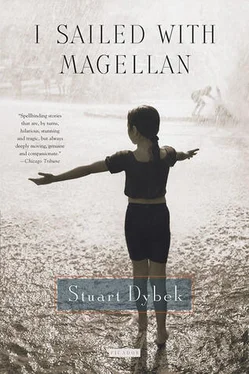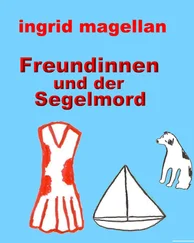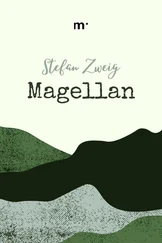“Well, just between us, what do you think it’s really worth?” my father asked. “If you were shopping for it.”
“Whatever the tag says, mo’.”
That second mo ’ caught my attention. The first time, I’d thought maybe he’d mumbled “man,” but it was mo ’ as in mo-fo as in motherfucker. I wondered if he was high. My father seemed not to have noticed. His general obliviousness to gang etiquette in the neighborhood had always alarmed me.
“Suppose the tag fell off,” my father prodded. “Trees don’t grow in nature with price tags, you know.”
The kid shrugged as if it wasn’t worth talking about. “Look, mo’, you buy it or you don’t.”
“I offered a fin … with an extra six bits in it for you if you saw the stump,” my father said, conspiratorially.
“Why you come here and insult me for, mo’?”
“What? You want I go see what the competition has to offer? Maybe you haven’t noticed, but they got a very nice selection of trees down the block, and another down the block from that,” my father said, not letting on that we’d already cased every lot in an eight-block radius before he decided this lot had the cheapest trees — no doubt because they were the scruffiest. “There’s more trees out there than customers,” my father informed him, amused by the irrefutable laws of capitalism now working to his advantage.
“So go fucken waste their time.”
Mick and I looked at each other and back at the guy.
“What you looking at? How you like I shove that sled up your ass, kid?” he asked me.
We walked off, me dragging the sled.
“I didn’t like his attitude,” my father said.
I didn’t say anything. I was furious. All the other times my father had embarrassed me returned in a rush: the way he’d stop his beater in traffic to pick a piece of scrap he thought might be worth something off the street; how I’d unpack my lunch in school to find he’d made me what my friends called “a puke on white”—last night’s chop suey on now dissolved slices of Wonder bread; how at Maxwell Street, or Jewtown, as it was called with typical Chicago ethnic sensitivity, at the outdoor market my father haunted where endless haggling was the rule, while I tried on trousers behind the makeshift dressing room of a windblown sheet, he’d yell, “Do they fit in the crotch?” I was banging the sled over curbs as if yanking the leash on a dog I was trying to kill.
“Pa-rum-pa-pum-pum,” Mick hummed to himself as he had the entire time we’d been out. “Me and my drum.”
“Hey, take it easy on that sled,” my father said. “If you can’t make something, don’t break it.”
I gave the sled a jerk that slammed it along a building so its metal runners sparked off the bricks, and my father stopped, challenging me to try it again. “Someone having a problem here?”
“You are really a Scrooge, mo’,” I told him, and braced for an attack that, this time, didn’t come.
Later that night, while Mick helped Moms bake gingerbread, my father and I strung the Bubble Lites on a Scotch pine to a burble of carols courtesy of the Lawrence Welk orchestra. It was the first long-needled pine we’d ever had, and it seemed exotic — a pedigreed Persian cat of a tree. It still had pinecones on it. The bushy needles made stringing the lights trickier, my father observed, then we continued working in silence.
“Be a good night for some homemade eggnog,” he offered. “The real thing made the old-fashioned way.” He prided himself on his eggnog; it was the best I’ve ever had. He began talking about his father — my grandfather — whom he never mentioned and whom I’d never really met. I thought of him as my father’s father rather than as my grandfather. My father remembered how at Christmastime his father would send him to a barrelhouse — a tavern where beer barrels served as a bar — with a pail to bring back a special holiday brew. Everybody at the tavern knew his father. There were local prize fights back then, one tavern’s champ against another’s, and his father, whose name was Michael, fought every Friday night. He fought as the Wild Goral, which sounded like an abbreviation for “gorilla,” but meant the wild man from the Tatra mountains — although, my father added cryptically, Mike might have been half Jewish and no hillbilly at all. He told me how once his father came home late with his front teeth broken and how he sat groaning, slugging from a fifth of whiskey and spitting blood into the beer pail as he worked at his teeth with a pair of pliers, trying to pull the stubs out of his bloody gums so he wouldn’t have to pay a dentist. Finally, he tried to get my father to yank out what was left of his teeth, and when my father wouldn’t, Mike got furious and chased him, trying to brain him with the whiskey bottle until he escaped by running out of the house.
Long past midnight on one of those Friday nights, drunken men brought the Goral home, half-conscious, blood running from his nose, mouth, and ears, his paycheck gone. He lay moaning in bed for a day, then slept for two more, and when he regained consciousness he was dazed, speechless, nearly helpless, and finally, after weeks that way he was taken to Dunning, the state mental hospital, a Palookaville from which he never returned.
My grandmother Victoria barely spoke English. She worked at home as a seamstress during the day. After they took Mike away, she got a second job at night scrubbing floors in a downtown office building. My father was eleven at the time, the oldest of the six kids, so as the man in the family, he had to work several jobs. He rose at five a.m. to deliver milk, then delivered newspapers, then attended grade school, and immediately after school he headed for the flower shop on Coulter Street, where he worked until suppertime. The shop was closing late on the Christmas Eve of the first year of Mike’s incarceration when the florist told my father there was a rush order on a wreath — not a Christmas wreath but a funeral wreath. They made it from pine boughs anyway, stuffed with wet sphagnum moss and tied with a black ribbon; my father helped work on it and the florist sent him to deliver it. The address was in a neighborhood my father wasn’t familiar with. He went through the city in the dark, half lost on the snow-drifted streets, holding the wreath out before him. He didn’t have gloves, and when he finally found the address, on a street that has since been erased by an expressway, he couldn’t knock because his hands were frozen to the wreath. He had to kick at the door.
A boy his own age answered, the son of the man who had died. The family couldn’t afford a funeral home so the body, dressed in a Sunday suit, was laid out in a small living room, or parlor, as my father called it — he always referred to living rooms as parlors. When the kid who answered the door saw that my father couldn’t let go of the wreath, he invited him in and sat him down beside the oil stove. There was a pan of water on top of the stove, and the kid, Teddy Kanik, brought a washcloth and towel and bathed my father’s hands until they thawed. He made him a cup of tea. They were best friends from that day on.
It’s a story I heard my father tell twice: once that evening as we strung the Bubble Lites on the Scotch pine, and then again, thirty years later, after he’d retired from his job at the foundry. He’d retired in Memphis, Tennessee, where he’d been transferred when the Harvester plant closed in Chicago. I was visiting after he’d had a stay in the hospital for the kidney ailment that would ultimately take his life. We were telling stories, laughing about all the crazy people from the old neighborhood, and I tried to get him to tell what he remembered about Poland. He was very young when, to use his phrase, “they came over on the boat.” Instead, he told the story about his father again, and when he reached the part about kicking at Teddy Kanik’s door, hands frozen to the funeral wreath, unable to knock, he broke into tears, something I’d never seen him do, excused himself, and rushed from the room.
Читать дальше












